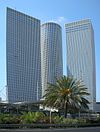Portal:Israel/Selected article/8
Tel Aviv is the second most populous city in Israel, with a population of 404,400 and a land area of 52 km2 (20 sq mi). The city is located on the Israeli Mediterranean coastline in central-west Israel. It is the largest and most populous city in the Tel Aviv Metropolitan Area, home to 3,325,700 residents. The city is governed by the Tel Aviv-Yafo municipality, headed by Ron Huldai. Residents of Tel Aviv are referred to as Tel Avivim. As the United Nations and most countries do not recognise Jerusalem as the capital of Israel, Tel Aviv is home to most foreign embassies. Tel Aviv was founded in 1909 by the Jewish Community of Jaffa (Hebrew: יָפוֹ Yafo; Arabic: يافا Yāfā), on the outskirts of the ancient port city. The growth of Tel Aviv soon outpaced Jaffa, which had a majority Arab population at the time. Tel Aviv and Jaffa were merged into a single municipality in 1950, two years after the establishment of the State of Israel. Tel Aviv's White City, designated a UNESCO World Heritage Site in 2003, comprises the world's largest concentration of Bauhaus buildings. Known as "The City That Never Sleeps", Tel Aviv is the fifth-most-visited city in the Middle East and Africa, with 2.5 million international visitors annually. It is renowned for its 24-hour culture, cosmopolitan lifestyle, beaches, bars, restaurants, cafés, parks, shopping, and landmark neighborhoods such as Old Jaffa and Neve Tzedek.

